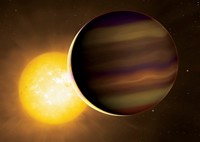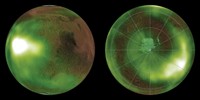Advertisement
Grab your lab coat. Let's get started
Welcome!
Welcome!
Create an account below to get 6 C&EN articles per month, receive newsletters and more - all free.
It seems this is your first time logging in online. Please enter the following information to continue.
As an ACS member you automatically get access to this site. All we need is few more details to create your reading experience.
Not you? Sign in with a different account.
Not you? Sign in with a different account.
ERROR 1
ERROR 1
ERROR 2
ERROR 2
ERROR 2
ERROR 2
ERROR 2
Password and Confirm password must match.
If you have an ACS member number, please enter it here so we can link this account to your membership. (optional)
ERROR 2
ACS values your privacy. By submitting your information, you are gaining access to C&EN and subscribing to our weekly newsletter. We use the information you provide to make your reading experience better, and we will never sell your data to third party members.
Physical Chemistry
Exoplanet’s Methane Spotted From Hawaii
A Mauna Kea infrared telescope detects gases in the atmosphere of a distant planet––a first from Earth’s surface
by Elizabeth K. Wilson
February 8, 2010
| A version of this story appeared in
Volume 88, Issue 6

A telescope atop Mauna Kea volcano in Hawaii has detected fluorescent infrared emission stemming from methane in the atmosphere of a giant, Jupiter-like extrasolar planet—the first time such a measurement has been made from Earth’s surface (Nature 2010, 463, 637). NASA’s space-based Hubble and Spitzer telescopes, orbiting above Earth’s interfering atmosphere, had been necessary to make such discoveries. For example, these telescopes have already found methane, water, carbon dioxide, and carbon monoxide in this particular planet’s atmosphere. Thanks to new, error-correcting calibration methods developed by an international team led by Mark R. Swain of the Jet Propulsion Laboratory, in Pasadena, Calif., successful ground-based measurements may now become commonplace and complement space-based observations. Swain and coworkers used NASA’s Infrared Telescope Facility (IRTF) on Mauna Kea to observe the planet known as HD189733b, which closely orbits a star 63 light years from Earth. IRTF can observe IR spectral regions not possible with the space-based telescopes, allowing it to record the methane emission from HD189733b’s upper atmosphere.





Join the conversation
Contact the reporter
Submit a Letter to the Editor for publication
Engage with us on Twitter